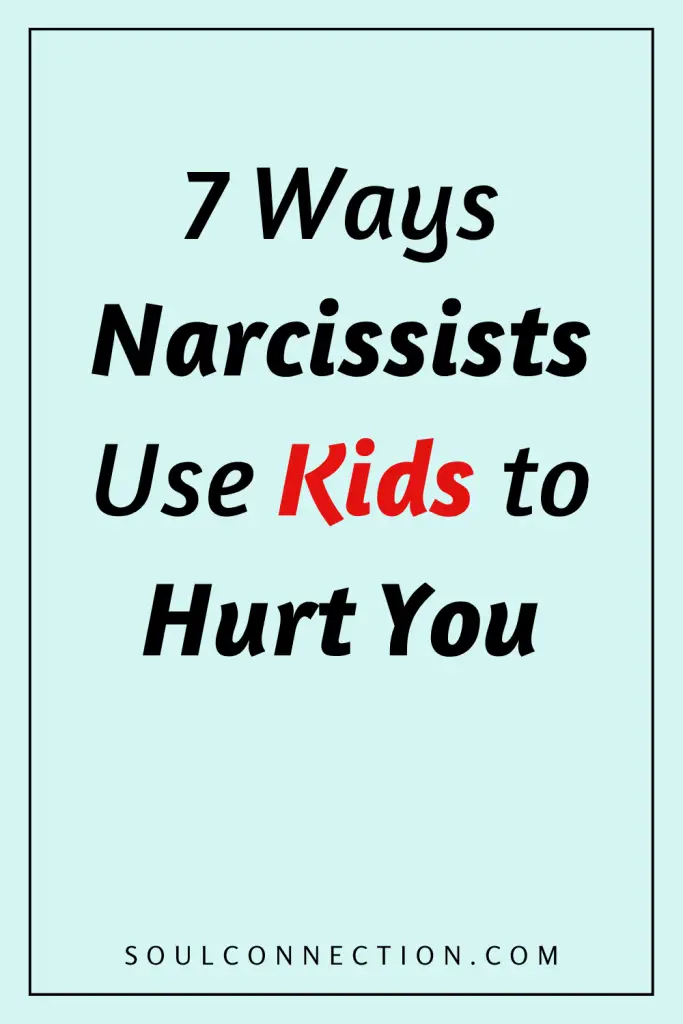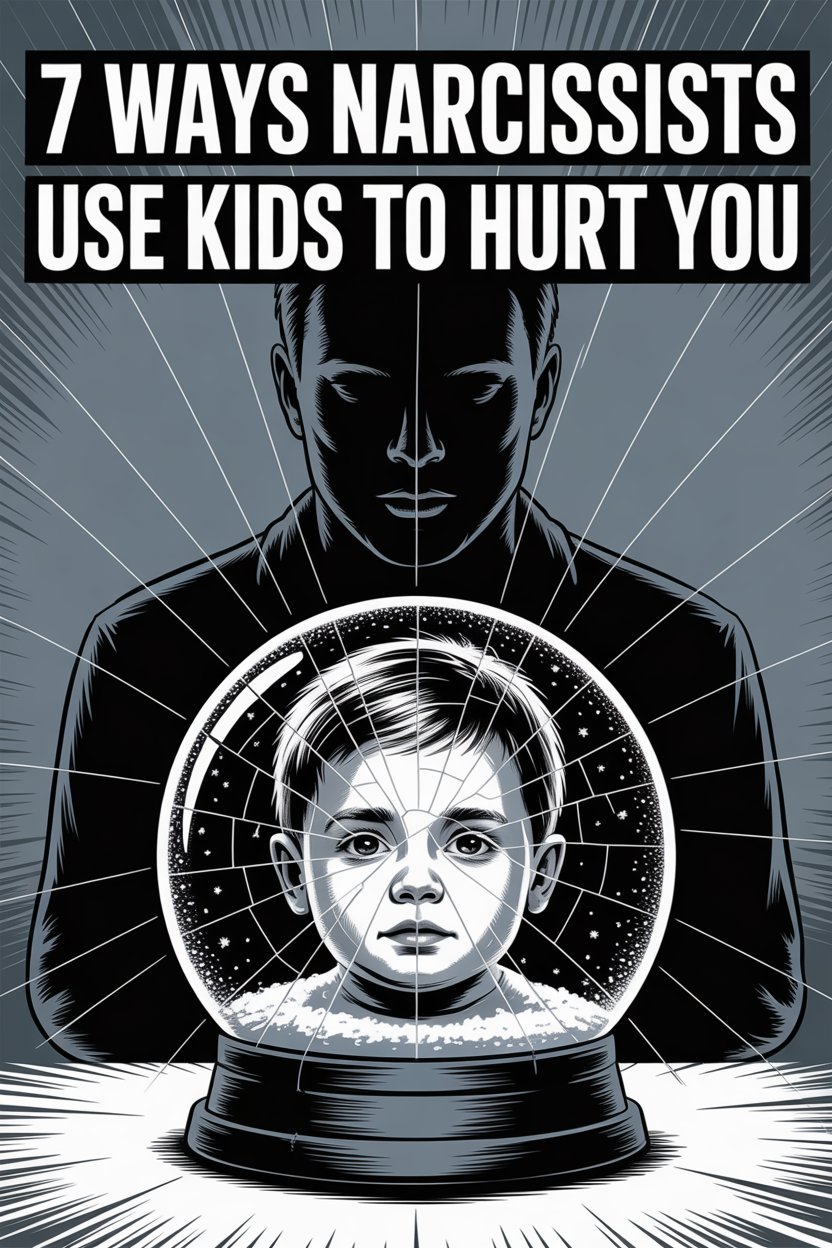Parenting alongside a narcissist can feel like playing chess with someone who keeps replacing your pawns with live squirrels. No matter how well you plan, chaos still finds a way to crawl across the board.
If you’ve ever wondered why life feels like a low-budget soap opera when trying to co-parent (or just survive) with a narcissist in the mix, there’s a reason.
Narcissists see kids not just as adorable little humans, but as handy Swiss Army knives for pushing your buttons.
Here’s how narcissists use kids to hurt you, all with the subtlety of a toddler on a sugar high.
1. Turning Kids Into Mini-Messengers
Narcissists adore sending emotional bombs through tiny couriers. Why deal directly with you when they can send a message through the children—preferably one packed with guilt, blame, or just enough confusion to start the next family argument?
It could be as subtle as, “Tell your mom she’s late again,” or as loaded as, “Ask your dad why he never wants to see you.” The kids end up tangled in adult problems, and you’re left cleaning up both their confusion and your own exasperation.
Here’s what helps: Take a deep breath and set a boundary. Calmly explain to your child that grown-up matters are for grown-ups. Resist the urge to respond through your child, no matter how tempting.
Keep communication direct—if you have to, write it down, mail it by carrier pigeon, or carve it in stone. Just don’t drag your child into the crossfire.
2. Playing the Victim in Front of the Kids
If there were an Olympic sport for martyrdom, narcissists would be gold medalists—at least in their own minds. They know exactly how to look wronged and pitiful in front of the little ones, turning bath time into a Shakespearean tragedy.
Cue the dramatic sighs and the whispered, “I wish your mom actually cared,” or, “Your dad always leaves me to handle everything.” Suddenly, you’re the villain in a story you didn’t sign up for.
Resist the urge to defend yourself in front of the kids. Instead, remind them that sometimes adults say things that aren’t fair or true when they’re upset.
Let your actions do the talking; consistency and kindness have a funny way of outlasting even the juiciest narcissistic monologue.
3. Manipulating Schedules to Cause Chaos
Narcissists treat co-parenting calendars like a Rubik’s cube—one they’ll never solve, but will sure make you feel stupid for trying.
One week, they insist on seeing the kids for every meal; the next, they’re “too busy” and cancel at the last minute, leaving you scrambling for childcare or a bottle of wine (or both).
Unpredictability is the point. It’s designed to keep you off balance and stressed, while the narcissist basks in the glow of being “spontaneous.”
Arm yourself with a solid schedule and keep records. Communicate changes in writing (emails are ideal—text messages are fine, unless you like scrolling through 78 angry emojis).
When possible, stick to the agreement. If you’re dealing with court orders, treat them like sacred texts. The less room you give for games, the less fun it is for the narcissist.
4. Using Gifts and Rewards to Buy Loyalty
Narcissists can turn gift-giving into an extreme sport. Forget a simple birthday present—think new phones, designer sneakers, entire trips. All wrapped up with the message: “Dad is the fun parent; Mom is the fun police.”
The intention isn’t generosity. It’s leverage. Gifts come with invisible strings, and kids learn to connect love with stuff—or worse, to view one parent as stingy.
Have a chat with the kids about what real love looks like. Spoiler: It’s not something you can charge on a credit card.
Gently reinforce that both parents care in different ways, and avoid falling into the trap of trying to outdo the narcissist’s spending spree. Emotional security outlasts the latest iGadget, even if it doesn’t come with a warranty.
5. Gaslighting Kids About Reality
Narcissists never met a fact they couldn’t twist. They’ll rewrite history, claim things never happened, or insist that you’re the one who’s “making a fuss.” Even worse, they’ll do it in front of the kids, who end up not knowing what to believe.
“Your mom always forgets your games.”
“Your dad said he doesn’t want to come to your recital.”
“Why are you sad? No one yelled at you.”
This kind of mind-melt leaves kids doubting their own feelings and memories.
Provide gentle validation. When your child seems confused or anxious, listen without judgment. Encourage them to trust their own experiences and feelings.
If they ask about something the narcissist said, stick to simple, neutral truths: “Sometimes people remember things differently. I’m here for you if you want to talk about it.”
6. Withholding or Limiting Affection Based on Loyalty
Narcissists love to turn affection into a prize for good behavior (where “good behavior” means taking their side). This emotional Monopoly game teaches kids that love is conditional, and every visit is a test.
A child who comes home happy from the other parent’s house might face the cold shoulder. Or the narcissist might say, “Why do you love Mom more than me?” Subtle guilt trips follow, and kids start balancing love like a seesaw.
Remind your child that love isn’t something they have to earn or ration out. Show them it’s safe to enjoy time with both parents. If they confide in you about feeling pressured, validate their feelings without adding fuel to the fire.
Your steady presence makes a bigger difference than you know.
7. Dragging Kids Into Adult Conflicts
When things get ugly, narcissists will haul out the big guns—using children as witnesses, allies, or even spies. Suddenly, your child knows way too much about legal battles, money problems, or every not-so-flattering thing their other parent has ever done.
This isn’t just inappropriate. It’s unfair and damaging. Kids end up feeling anxious, torn, or forced to pick sides.
Keep adult matters as adult as possible. If the narcissist insists on oversharing, create a safe space for your child to process. Explain—without bad-mouthing—that sometimes adults have conflicts that children don’t need to solve.
If necessary, consider professional support for your child (and maybe yourself, because you’re not a superhero, no matter how many times you’ve saved the day).
Reclaiming Your Sanity (and Your Kids’)
Life with a narcissist trying to wage psychological warfare through your kids can make you feel like the world’s worst referee at a game you never asked to play.
Here’s the plot twist: Kids are capable of learning resilience, especially when at least one adult (hint: that’s you) models sanity, stability, and unconditional love.
It won’t always be a fair fight, but it will be a worthwhile one.
Support your children. Set boundaries. Call in the professionals when necessary, and lean on your community of friends, family, and assorted internet strangers who understand what you’re up against.
And never forget: The narcissist didn’t write the parenting rulebook, no matter how loudly they claim to own the pen.


